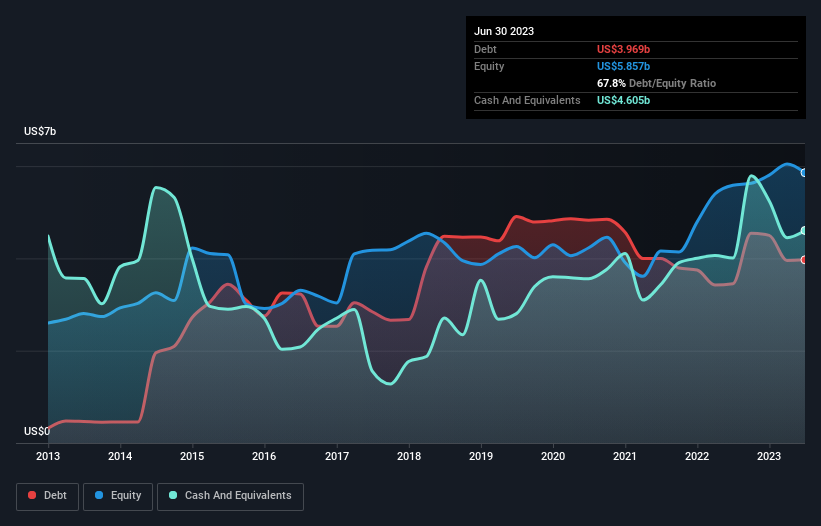
Howard Marks put it nicely when he said that, rather than worrying about share price volatility, 'The possibility of permanent loss is the risk I worry about... and every practical investor I know worries about.' So it might be obvious that you need to consider debt, when you think about how risky any given stock is, because too much debt can sink a company. We note that Lenovo Group Limited (HKG:992) does have debt on its balance sheet. But the real question is whether this debt is making the company risky.
When Is Debt Dangerous?
Debt assists a business until the business has trouble paying it off, either with new capital or with free cash flow. In the worst case scenario, a company can go bankrupt if it cannot pay its creditors. However, a more common (but still painful) scenario is that it has to raise new equity capital at a low price, thus permanently diluting shareholders. Of course, plenty of companies use debt to fund growth, without any negative consequences. The first step when considering a company's debt levels is to consider its cash and debt together.
Check out our latest analysis for Lenovo Group
What Is Lenovo Group's Debt?
As you can see below, at the end of June 2023, Lenovo Group had US$3.97b of debt, up from US$3.45b a year ago. Click the image for more detail. However, its balance sheet shows it holds US$4.60b in cash, so it actually has US$635.6m net cash.

How Healthy Is Lenovo Group's Balance Sheet?
According to the last reported balance sheet, Lenovo Group had liabilities of US$25.4b due within 12 months, and liabilities of US$6.69b due beyond 12 months. On the other hand, it had cash of US$4.60b and US$10.1b worth of receivables due within a year. So it has liabilities totalling US$17.3b more than its cash and near-term receivables, combined.
When you consider that this deficiency exceeds the company's huge US$12.8b market capitalization, you might well be inclined to review the balance sheet intently. In the scenario where the company had to clean up its balance sheet quickly, it seems likely shareholders would suffer extensive dilution. Given that Lenovo Group has more cash than debt, we're pretty confident it can handle its debt, despite the fact that it has a lot of liabilities in total.
It is just as well that Lenovo Group's load is not too heavy, because its EBIT was down 32% over the last year. When a company sees its earnings tank, it can sometimes find its relationships with its lenders turn sour. There's no doubt that we learn most about debt from the balance sheet. But ultimately the future profitability of the business will decide if Lenovo Group can strengthen its balance sheet over time. So if you're focused on the future you can check out this free report showing analyst profit forecasts.
Finally, while the tax-man may adore accounting profits, lenders only accept cold hard cash. Lenovo Group may have net cash on the balance sheet, but it is still interesting to look at how well the business converts its earnings before interest and tax (EBIT) to free cash flow, because that will influence both its need for, and its capacity to manage debt. During the last three years, Lenovo Group generated free cash flow amounting to a very robust 90% of its EBIT, more than we'd expect. That positions it well to pay down debt if desirable to do so.
Summing Up
Although Lenovo Group's balance sheet isn't particularly strong, due to the total liabilities, it is clearly positive to see that it has net cash of US$635.6m. And it impressed us with free cash flow of US$1.5b, being 90% of its EBIT. So although we see some areas for improvement, we're not too worried about Lenovo Group's balance sheet. When analysing debt levels, the balance sheet is the obvious place to start. However, not all investment risk resides within the balance sheet - far from it. We've identified 1 warning sign with Lenovo Group , and understanding them should be part of your investment process.
Of course, if you're the type of investor who prefers buying stocks without the burden of debt, then don't hesitate to discover our exclusive list of net cash growth stocks, today.
New: AI Stock Screener & Alerts
Our new AI Stock Screener scans the market every day to uncover opportunities.
• Dividend Powerhouses (3%+ Yield)
• Undervalued Small Caps with Insider Buying
• High growth Tech and AI Companies
Or build your own from over 50 metrics.
Have feedback on this article? Concerned about the content? Get in touch with us directly. Alternatively, email editorial-team (at) simplywallst.com.
This article by Simply Wall St is general in nature. We provide commentary based on historical data and analyst forecasts only using an unbiased methodology and our articles are not intended to be financial advice. It does not constitute a recommendation to buy or sell any stock, and does not take account of your objectives, or your financial situation. We aim to bring you long-term focused analysis driven by fundamental data. Note that our analysis may not factor in the latest price-sensitive company announcements or qualitative material. Simply Wall St has no position in any stocks mentioned.
About SEHK:992
Lenovo Group
An investment holding company, develops, manufactures, and markets technology products and services.
Very undervalued with excellent balance sheet and pays a dividend.


